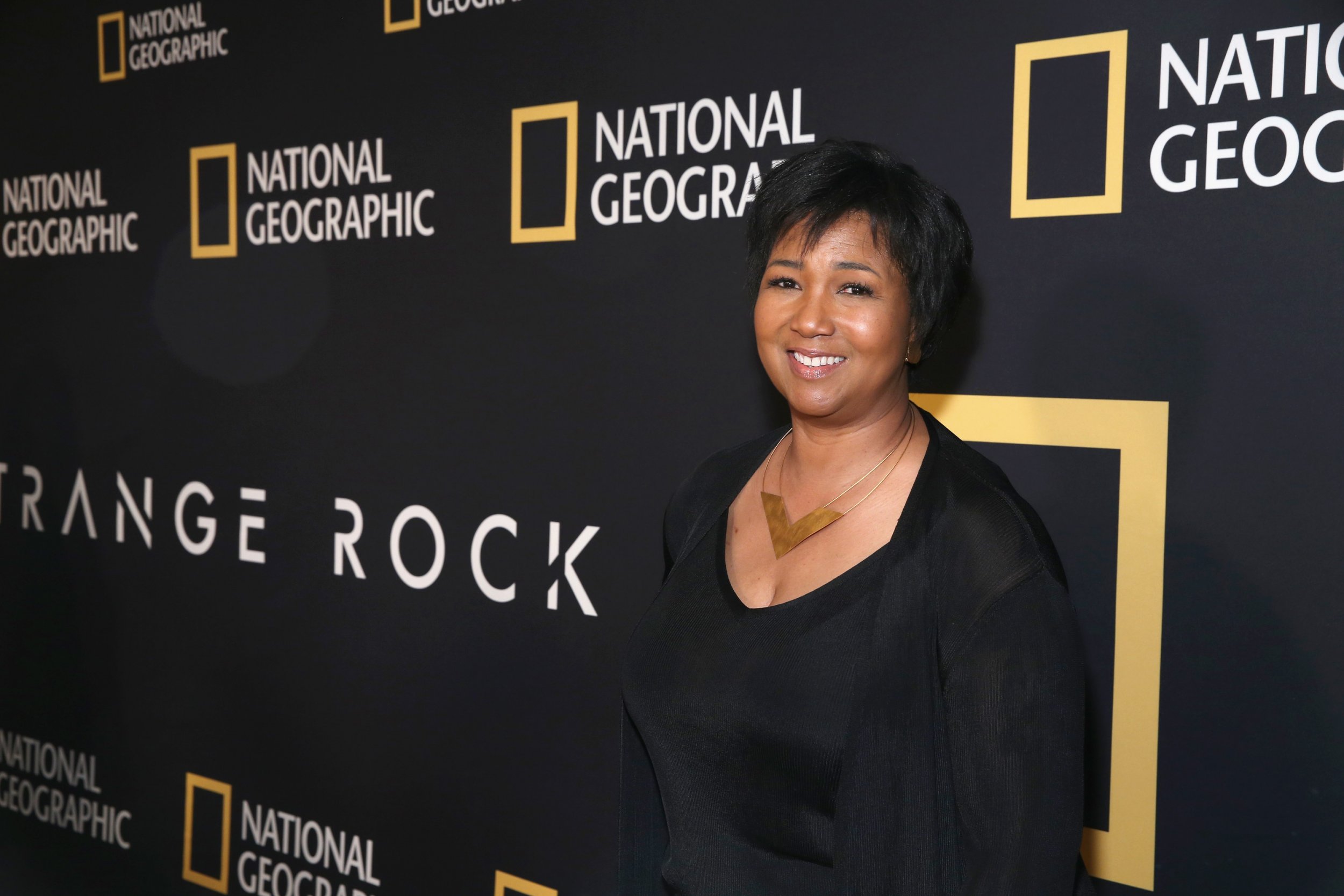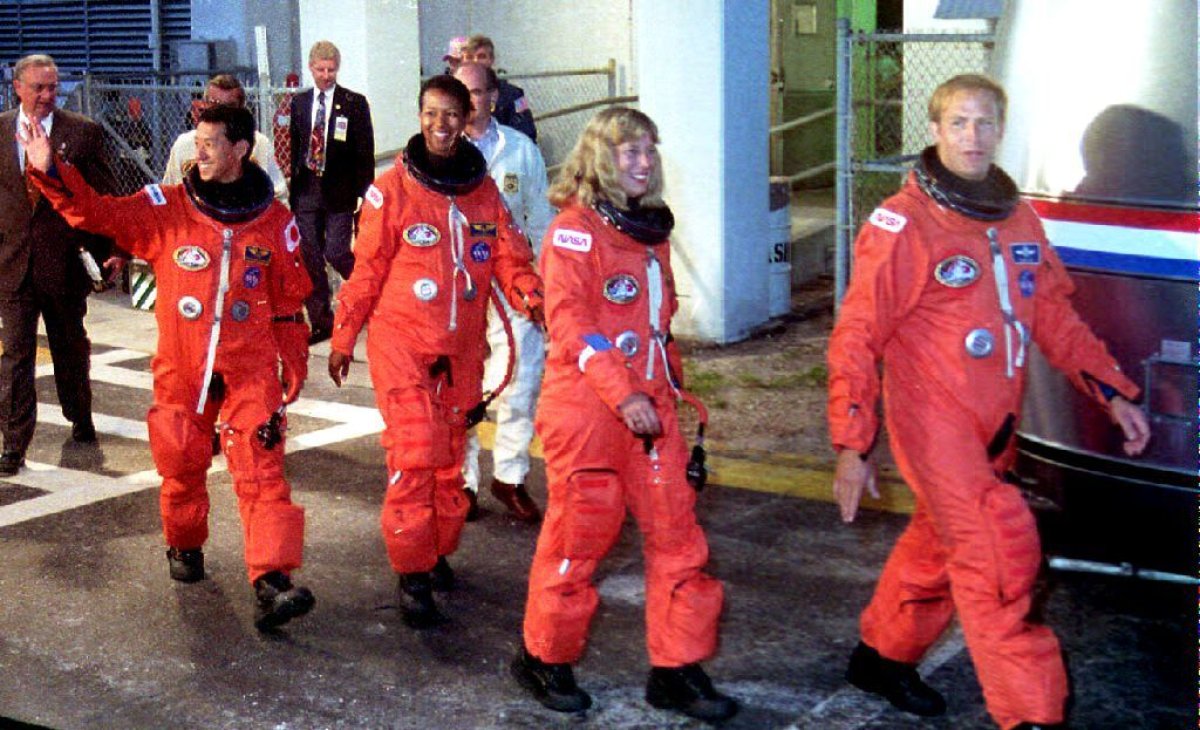
Mae Jemison left Earth just over 25 years ago and spent eight days floating weightless in orbit around our planet. Trained as a doctor, she was the first African-American female astronaut. But a quick jaunt into space hasn't kept her from appreciating life on Earth.
When I asked her what her favorite part of filming a new documentary about Earth was, she told me it was having two of her cats with her; I later emailed to confirm their names. She demurred. "While I won't provide my cats' names—they don't like being in the limelight—they have authorized me to say that they hail from Texas and variously like (in addition to fish and chicken and other meats) Sriracha sauce, spring salad mix, popcorn, papaya and the occasional palmetto bug."
These days, when she isn't tending her beloved cats, Jemison is leading 100 Year Starship, a DARPA-funded project to make human travel beyond our solar system feasible. We talked about Jemison's appearances in "One Strange Rock," a new National Geographic documentary exploring Earth's place in the universe. The first episode airs March 26.
This interview has been edited for length and clarity.
Tell me a bit about the new series and your episode on the origins of life.
What was really exciting was I got to talk about this whole idea of us being integrated with this planet, which is one of the things I fundamentally believe that we as humans forget. We forget that the planet is not outside of us, that we can't exist separate from it, that we are a part of it. As a little girl growing up, I was fascinated about how life began and how the Earth was part of this universe. I bought books that I couldn't understand, I could only read parts of them because I needed some biochemistry to get the rest.
Do you think there's life beyond Earth?
When we talk about life we're probably talking about single cells, maybe in the waters of the moons around some of the gas giants. We don't really know, but here's the thing we do know: that we find life in unusual places here on Earth. And I'm sure when we go outside of our solar system there's lots of life—whether we'd recognize it and whether we can find traces of it will be an evolving story. But I don't think that the universe would go through all of this and it would be just us.
As a doctor and an astronaut, what stood out to you about how an astronaut's body responds to being in space?
I worked in Cambodian refugee camps and in West Africa, so I saw a lot of things there that were quite interesting and extreme medicine. By the time I got involved with space exploration, I had seen a lot. The thing about space exploration is you're taking physiologically normal people and stressing their physiology in an extreme environment.
Do you have any medical concerns about humans, say, living on the Moon or on Mars?
When you're on Mars and the Moon, you can get back to the Earth pretty easily, you can stock supplies, medicines, rely on the Earth's infrastructure. The major issue is going to be how do we support deep space, how do you create an infrastructure that will support human health when it would take you 10 years to get home? You're going to have to have a level of autonomy and independence that we don't have and aren't required to have with the Moon and even to a certain extent Mars.
Here on Earth, our food crops are able to grow because there's bacteria in the soil that help them fix nitrogen, and that microbiome is replenished constantly from different places. We have a certain bacteria in our gut to help us survive. What happens if it's not constantly replenished? What keeps it healthy? Those are questions that we have to answer.
You've said you always wanted to go into space. What made you apply to be an astronaut?
I finally got to the point where it was time in my career. I think sometimes people hold themselves back, they say "oh, should I do that, do I have the qualifications?" I had the background, sometimes without even knowing that's what I was developing. I think the biggest issue was to go ahead and apply.
When you went into space, it was noteworthy. What do we need to do to make it normal for a black woman to be in space?
As a little girl. I always knew it was nonsense when the U.S. didn't have women astronauts. In fact, it really pissed me off. I was really quite irritated. I was actually the first woman of color in the entire world to go into space. That makes no sense whatsoever. So how do we make it less noteworthy? Well, we have to damn make it normal, don't we? Let's make it so that we use people for their talents and skill sets.

What do you think of NASA reassigning Jeanette Epps off of this year's space station astronaut crews?
Jeannette is an extremely brilliant woman and well qualified, and I'm looking forward to NASA rectifying it because she certainly is a brilliant astronaut. I'm looking forward to NASA correcting this and helping us understand what they did.
Would you go back?
I'd go up to space in a heartbeat. I'd like to take a tour of the solar system and keep heading on out. If we'd been going to Mars or the Moon I would have sat in the astronaut office twiddling my thumbs, but I had other things that I needed to contribute. What difference does it make if I was the first woman of color to go into space if I didn't use my position to make other things happen? We have a right to move the world forward.
After you landed, what was it like going back to your regular life?
I don't even know how to answer that because your life is your life, right? You say regular life like it's ho hum. I think that you have to pay attention to every day. There's always something fascinating about everything we do, every moment.
What do you hope people take away from your work?
At some point in time we need to see ourselves as Earthlings, as we share the planet. That's the only way we're going to move forward.
Uncommon Knowledge
Newsweek is committed to challenging conventional wisdom and finding connections in the search for common ground.
Newsweek is committed to challenging conventional wisdom and finding connections in the search for common ground.
About the writer
Meghan Bartels is a science journalist based in New York City who covers the science happening on the surface of ... Read more
To read how Newsweek uses AI as a newsroom tool, Click here.








